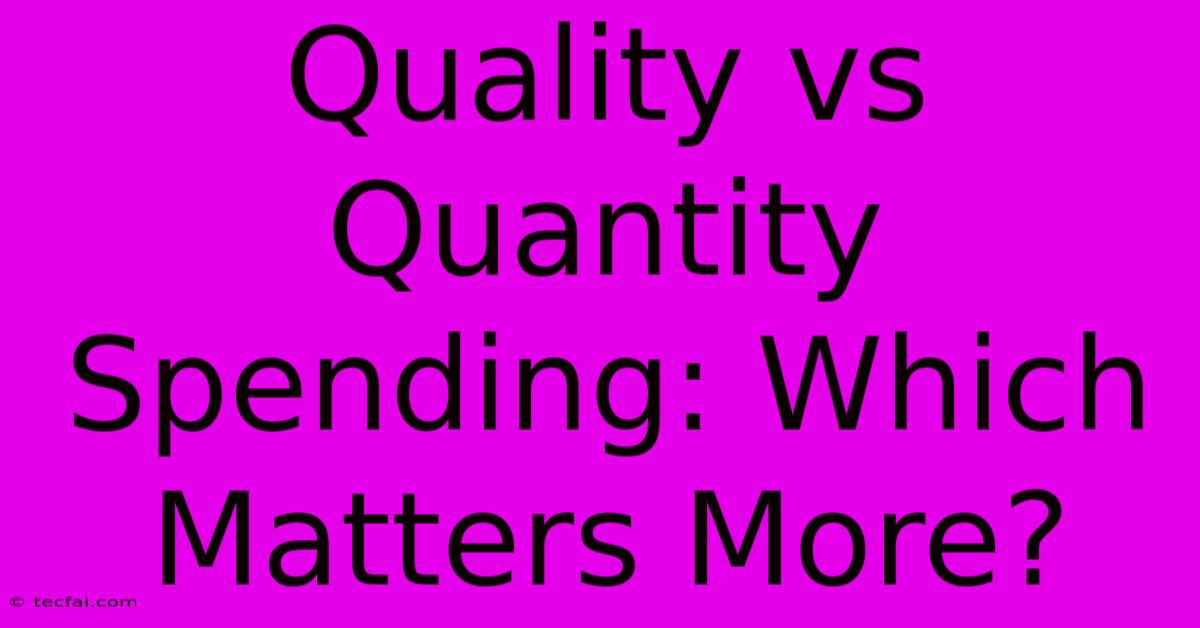Quality Vs Quantity Spending: Which Matters More?

Discover more detailed and exciting information on our website. Click the link below to start your adventure: Visit Best Website tecfai.com. Don't miss out!
Table of Contents
Quality vs. Quantity Spending: Which Matters More?
The age-old debate: is it better to buy many inexpensive items or fewer, higher-quality ones? The answer, as with most things, is nuanced. It depends entirely on your priorities, values, and the specific item in question. This article will delve into the pros and cons of both approaches, helping you determine which spending philosophy aligns best with your lifestyle and financial goals.
Understanding the Quality vs. Quantity Dilemma
The core of this debate lies in understanding the long-term implications of each approach. Quantity spending prioritizes acquiring many items at lower price points. Think fast fashion, disposable electronics, or budget-friendly home goods. Quality spending, on the other hand, emphasizes investing in fewer, durable, and often more expensive items built to last. This could involve buying premium appliances, handcrafted furniture, or ethically sourced clothing.
Quantity Spending: The Pros and Cons
Pros:
- Accessibility: Quantity spending allows access to a wider variety of goods and experiences. You can afford more items, explore different styles, and replace things easily.
- Immediate Gratification: The instant pleasure of acquiring something new is a significant motivator for many.
- Lower Upfront Cost: This is the most obvious advantage. Budget-friendly options make it easier to manage short-term finances.
Cons:
- Lower Durability: Items purchased for their low price often break down or become unusable sooner, leading to higher replacement costs in the long run.
- Environmental Impact: The rapid consumption associated with quantity spending contributes to waste and environmental damage.
- Lower Resale Value: Cheap items typically have little to no resale value, meaning you lose money when you discard them.
- Potential for Inferior Quality: Lower prices often reflect compromised quality in materials, craftsmanship, and functionality.
Quality Spending: The Pros and Cons
Pros:
- Longevity: Quality items are designed to withstand wear and tear, lasting much longer than cheaper alternatives.
- Higher Resale Value: Investing in quality often means retaining a significant portion of your initial investment when reselling.
- Superior Performance and Functionality: High-quality products typically perform better and offer enhanced features.
- Reduced Environmental Impact: Buying fewer, durable items reduces consumption and waste.
- Satisfaction and Value: The feeling of owning a well-made, lasting item often provides greater satisfaction than fleeting purchases.
Cons:
- Higher Upfront Cost: This is the primary barrier to quality spending. Investing in premium items requires a larger initial outlay.
- Less Variety: Focusing on quality might mean owning fewer items overall.
- Potential for Buyer's Remorse: The higher price tag can sometimes lead to second-guessing your purchase.
Finding the Right Balance: A Practical Approach
The ideal approach isn't necessarily choosing one extreme over the other. Instead, a balanced strategy often works best. Consider these factors:
- The Item's Purpose and Lifespan: For everyday items with short lifespans (like socks), quantity spending might be acceptable. For major purchases with long lifespans (like a refrigerator), prioritizing quality is crucial.
- Your Budget: Assess your financial situation. If you have limited funds, a balanced approach, combining some quality and some quantity purchases, is advisable.
- Your Values: Consider your environmental consciousness and ethical consumption habits. Prioritizing quality can often align with more sustainable practices.
- Research and Reviews: Before making any significant purchase, research the product thoroughly and read reviews to ensure you're getting your money's worth, regardless of price point.
Ultimately, the decision of quality versus quantity spending is deeply personal. By carefully considering the pros and cons, your budget, and your long-term goals, you can make informed choices that best suit your needs and values. The key is to be mindful of your spending habits and strive for a balanced approach that maximizes value and minimizes waste.

Thank you for visiting our website wich cover about Quality Vs Quantity Spending: Which Matters More?. We hope the information provided has been useful to you. Feel free to contact us if you have any questions or need further assistance. See you next time and dont miss to bookmark.
Featured Posts
-
Fitness Selfie Nina Nika At Mad Max
Dec 03, 2024
-
Trolley Problem No Easy Answers
Dec 03, 2024
-
Artetas Priority Isak And Gyokeres Passed Over
Dec 03, 2024
-
I Pulled My Own Teeth Six Year Delay
Dec 03, 2024
-
Sentier Promotes Apac Head Globally
Dec 03, 2024
